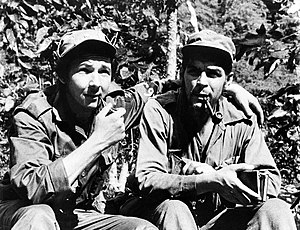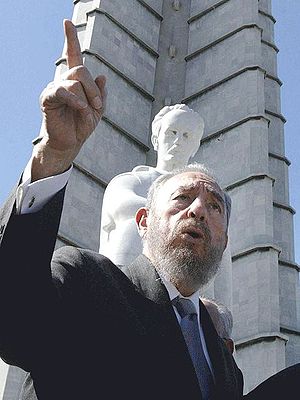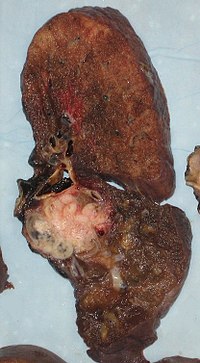(Havana, Cuba)—
U.S. President James Carter: First of all, allow me to express my gratitude for the opportunity to return to Cuba.
 |
| US President Jimmy Carter Talks About Cuba |
When I was President I did all I could to improve diplomatic relations between my country and Cuba. I eliminated all travel restrictions so that the Americans could travel here and Fidel Castro and I worked together to establish interest sections in Washington and Havana, which continue to allow for some kind of communication between our two countries.I believe we should immediately eliminate the trade embargo that the United States has imposed on the people of Cuba and also allow travel without any kind of restriction from the U.S. to Cuba and vice-versa, so I think it’s important that I’ve come. On this occasion, I wanted to learn from the Cuban government’s principal officials about the coming Party Congress, which will take place mid-April and I have received information from the President of the National Assembly, President Raúl Castro and former President Comandante Fidel Castro and other leaders of the Cuban government about plans for the future.
Cuban officials are very proud of the fact that they have received good comments from the people of Cuba and many suggestions have been incorporated, as I understand, into the text which will be discussed during their Congress.
I hope that in the future this will be added to those documents and that there will be complete freedom so all Cubans can express themselves, gather and travel, according to the international human rights norms which are applied in Cuba.
In addition to meeting with President Raúl Castro for a very extensive conversation and this morning with Fidel Castro, who appears to be in good health and we welcomed each other like old friends, I met this morning with some of the groups which criticize the Cuban government and, I hope that in the future some of their complaints will be addressed by the government.
I met with about 12 prisoners who were freed on orders from
President Raúl Castro and sponsored by the Cardinal. Evidently they want to meet with others who have returned from Spain or other places. I met and talked with President Raúl Castro and I will do so again after this conference.
It is also important to me that the relations between our two countries improve.
I believe that the detention of the Cuban Five makes no sense, there have been doubts expressed in U.S. courts and by human rights organizations around the world. They have now been in prison 12 years and I hope that in the near future they will be freed to return to their homes.
I meet with two of the prisoners’ mothers and three prisoners’ wives and expressed my feelings to them, that I hope that in the future they will be freed, according to U.S. law.
Also this morning, I was able to meet with Alan Gross, a man who I think is not guilty of being a serious threat to the people or government of Cuba. He has been given a long prison sentence and I hope he will be freed soon as well.
So, there are many things that can be done between our two countries to improve relations and come to have normal relations in as many ways as possible.
I will repeat my thanks to President Raúl Castro and other Cuban officials for having allowed me to come and converse with them and I hope, for the future of Cuba, that all Cubans will be completely free and all Americans free to travel where they choose, you know that many of us cannot travel freely to Cuba and these restrictions in our country must be eliminated.
These are my initial comments and now I would be happy to answer two or here questions from the media. If there are no questions, we’re done.
Andrea Rodríguez (AP).—Sir, you mentioned that you had visited Mr. Gross. I would like to know if you have any idea when he might be released, if you, even, might be taking him home, one way or another. What possibility is there that an exchange of this person for the five agents detained in the United States. Have you received any indication from President Raúl Castro leading in this direction? Thank you.
James Carter.—I didn’t come here with the idea of arranging any swap. I think the two cases, that of Gross and that of the Five, are separate, different and shouldn’t be interrelated. I think Alan Gross should be free because he is not guilty of a serious crime and I think the five Cubans should be freed because they have already been in prison for 12 years and the original circumstances around their original trial are considered questionable, even by the judges and the U.S. judicial system. Therefore, I didn’t come with that objective.
I had a very good meeting this morning with Alan Gross, obviously he professes his innocence as he did during his trial. There will be an appeal by his lawyers to higher level courts in Cuba. I hope these higher level courts will declare him innocent of the crimes for which he is being punished , and if that isn’t the case, that then, possibly in the future, an executive order will be released conceding him a pardon or releasing him for humanitarian reasons. His daughter is very sick, he has lost other members of his family; he had lost 40 kilos of his own weight, but he appears to be in good spirits and asserts his innocence. I didn’t come with the expectation of taking him home. In fact, Cuban officials made it very clear, before I left my home, that the freedom of Alan Gross would not be granted.
Fernando González (Associated Press Television).—I understand that you did not come on an official or governmental visit but I would like to know if you plan on meeting with the Obama administration and, if you do, what will you say to him.
James Carter.—Well, before leaving I had spoken at some length with the National Security Advisor and Secretary of State Clinton about the situation that exists between our two countries. As I have always done, before any trip abroad, before leaving, I go to the White House and give a complete report about the trip to the President of the United States and the Secretary of State. This will be done within a day or two after my return to the U.S. and I will express the same opinions which I have shared with you in this conference, along with other more confidential issues which I must share in person with American officials.
Journalist.—On the basis of your talks in Washington before this trip and your talks here with President Raúl Castro, what steps do you think should be taken, what should each country do to improve relations?
James Carter.—I should like to see another step taken in current legislation to eliminate the restraints on travel for U.S. citizens; I should like all restrictions removed on the normal transfer of humanitarian funds to Cuba.
I met with a large number of ambassadors located here in Havana and United Nations representatives and they said that in the last two years it has been very difficult for them to depend on normal channels for humanitarian aid to the Cuban people, because the Americans are restricting transfers. European Union leaders, the ambassador of Brazil and others in the group have said the same thing to me. This is something that could be done immediately by the President of the United States in relation to the existing legislation.
I understand from the Foreign Minister of Cuba and also from all the ambassadors that these restrictions on the normal transfer of humanitarian funds into the banking system have been very restricting in the past two years. Since President Obama has been in his position I have shared that information with him.
I hope, in relation to other possibilities, as I have already stated, well, that Mr. Gross is released and that the five Cubans return to Cuba.
In addition to those aspects, I personally would like the Helms-Burton Act to be completely abolished. I believe it was a serious mistake when it was approved and signed by President Clinton.
Any efforts on the part of the United States to improve the lives of the Cuban people with financial aid or by other means is suspicious or illegal according to the Helms-Burton Act, because that Act, as you know, has the express objective of doing away with the Castro regime, of changing the regime. Therefore, this Act – in my opinion – is counterproductive. It didn’t exist when I was president, and I could basically do what I liked with restrictions on travel and the establishment of relations, et cetera.
These are some of the things that are evident to everyone, and Congressional leaders of Cuban origin are acting in a very counterproductive way, trying to blame or punish the Cuban regime, when in real terms they are punishing the Cuban people with their restrictions.
Journalist.—Mr. Carter, you are one of the few people, one of the few political figures who has the respect of both sides, would you accept a mediatory role between the two countries?
James Carter.—It is extremely unlikely, or possible, that both countries should solicit my services; I would be pleased to help, but I believe that that is extremely unlikely.
Journalist.—Mr. President Carter, when you were president you were not in agreement with the activities of violent exiles against Cuba. Do you have an opinion on taking Cuba off the list of terrorist countries?
James Carter.—Yes I believe that Cuba should be taken off the list of countries sponsoring terrorism. As you possibly know – I don’t know if you know – I understand that there has been very close cooperation between Cuban and American intelligence services in confronting the threats of Al Qaeda and other organizations in the Gulf region.
The only American allegations in terms of terrorism against the Cuban government are related to some of the groups in Colombia, the FARC and ETA in Spain.
When I met with the ambassadors of Spain and Colombia yesterday morning, they told me that they had absolutely no objection, that they thought that the capacity of members of ETA and FARC in Colombia to come to Cuba was something very positive for them, because it gave them an opportunity to communicate in a friendly way in Cuba with people who were causing problems in their own countries. And so the American allegations, the affirmation of terrorism, is a premise which is completely unfounded, and that is another aspect that the President of the United States could address; in other words, eliminate the statement that Cuba is sponsoring terrorism, because it is evidently untrue.
I can take one more question.
Michael Boston (BBC).—You have met with President Raúl Castro and former President Fidel Castro. You have talked about your desire to see freedom of expression, freedom of assembly, the right of Cubans to travel abroad; you have also talked about the economic changes which are to be discussed at the Congress. Have you had any indications of any political change to be discussed?
James Carter.—Not at all.
Well, I would say that both the leaders who you mentioned and the authorities are familiar with my own opinions on the freedom of travel, of assembly and of expression in Cuba – when I was here nine years ago I addressed the Cuban people on television, on radio, and my words were presented in Granma exactly as I said them, expressing these desires and these recommendations to the Cubans – they know my beliefs that there should be changes, and I repeated them in the press conference.
I am not familiar with the details or aspects of the text that is now being discussed for the Party Congress. They have told me that approximately eight million Cubans participated, giving their opinions. The Minister of Foreign Affairs told me that thousands of amendments to the original text were proposed. It is also being said that more than 65% of the paragraphs have been modified on the basis of the proposals; but I am not familiar with the details.
However, the dissident groups said this morning that many of them have abstained from expressing their concerns about personal freedoms, because they do not want to be associated with the proceedings, because they are not in agreement with its integrity.
Other groups with whom I met this morning have expressed their concern that standard international freedom must be promoted. So I am not familiar with what they are intending to do.
Thank you all very much indeed.
Mr. James Carter
Former U.S. President Of The United States of America,
CALL CUBA
 Image via WikipediaCuba's new Real Estate law officially starts Nov. 10 but for now its only for Cuban citizens and permanent foriegn residents. Cuban newspapers headlines screamed the long awatied news on the front page of Thursday's Granma which is Cuba's Communist Party news paper.
Image via WikipediaCuba's new Real Estate law officially starts Nov. 10 but for now its only for Cuban citizens and permanent foriegn residents. Cuban newspapers headlines screamed the long awatied news on the front page of Thursday's Granma which is Cuba's Communist Party news paper.
 Image via WikipediaCuba's new Real Estate law officially starts Nov. 10 but for now its only for Cuban citizens and permanent foriegn residents. Cuban newspapers headlines screamed the long awatied news on the front page of Thursday's Granma which is Cuba's Communist Party news paper.
Image via WikipediaCuba's new Real Estate law officially starts Nov. 10 but for now its only for Cuban citizens and permanent foriegn residents. Cuban newspapers headlines screamed the long awatied news on the front page of Thursday's Granma which is Cuba's Communist Party news paper.




 Cuban Mansions for Rent
Cuban Mansions for Rent








